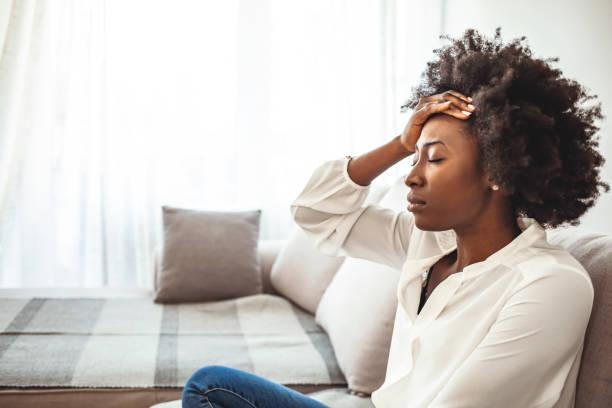Common Issues in Women's Mental Health

With Women’s History Month starting out, what better time to discuss the history of mental health disorders in the female population? Mental health disorders are common among women - over 1 in 5 adult American women have struggled with a mental health disorder in the last twelve months. Depression and anxiety are particularly common in women. Additionally, symptoms from common mental health disorders may present differently in women than in men - for example, women may experience more physical symptoms, like nausea and disturbed sleep, than men.
With the variety of mental health disorders one may experience, it may be hard to determine which disorders are more prevalent in the female community. Check out three common issues in women’s mental health below:
Anxiety
In general, women are at 2x the risk of developing an anxiety disorder than men. In women, anxiety may present as feeling keyed up or on edge, feeling irritated, lacking sleep, hyperventilating, feeling palpitations, sweating, gastrointestinal problems, or difficulty concentrating. Anxiety can develop from a variety of sources; women may develop anxiety from stress due to balancing multiple life roles, gender expectations, sexism or harassment in the workplace, pressure from motherhood, and more.
Depression
Women were also nearly twice as likely as men to develop depression in their lifetime. In women, depression can show up as physical symptoms like cramps, bloating, aches, and pains, exhaustion, difficulty concentrating, thoughts of death or dying, mood swings, and disturbed eating and sleeping patterns. Depression has no single origin, but can develop for women due to premenstrual hormones, changes in hormonal cycles, pregnancy, pressures from daily life, loss, and more.
Eating Disorders
An overwhelming amount - between 85% and 95% - of individuals with eating disorders are women. There are a variety of eating disorders which may cause women to eat an excess amount of food at one time, use a forcible method such as vomiting to expel food, restrict the amount or frequency of meals, experience untrue self-concept, and over-exercise. Eating disorders develop for many reasons, but some reasons for women are experiences of trauma, substance use, unrealistic body standards, oppressive ideals of beauty, life transitions, and genes or heredity.
While there are numerous mental health disorders that impact women in specific ways, there is good news: mental health therapy can help. At Higher Life Pathways, we have clinicians experienced not only personally but professionally with common mental health issues for women. We’d love to walk beside you in your mental health journey - whether you’re battling with anxiety, depression, eating disorders, or any other affliction that intersects with being female-identified. Reach out to us today to schedule an appointment!
Higher Life Pathways Counseling Services
1800 Diagonal Road, Suite 600 Alexandria, VA 22314
Email: [email protected]
Phone: (571) 946-8115

With Women’s History Month starting out, what better time to discuss the history of mental health disorders in the female population? Mental health disorders are common among women - over 1 in 5 adult American women have struggled with a mental health disorder in the last twelve months. Depression and anxiety are particularly common in women. Additionally, symptoms from common mental health disorders may present differently in women than in men - for example, women may experience more physical symptoms, like nausea and disturbed sleep, than men.
With the variety of mental health disorders one may experience, it may be hard to determine which disorders are more prevalent in the female community. Check out three common issues in women’s mental health below:
Anxiety
In general, women are at 2x the risk of developing an anxiety disorder than men. In women, anxiety may present as feeling keyed up or on edge, feeling irritated, lacking sleep, hyperventilating, feeling palpitations, sweating, gastrointestinal problems, or difficulty concentrating. Anxiety can develop from a variety of sources; women may develop anxiety from stress due to balancing multiple life roles, gender expectations, sexism or harassment in the workplace, pressure from motherhood, and more.
Depression
Women were also nearly twice as likely as men to develop depression in their lifetime. In women, depression can show up as physical symptoms like cramps, bloating, aches, and pains, exhaustion, difficulty concentrating, thoughts of death or dying, mood swings, and disturbed eating and sleeping patterns. Depression has no single origin, but can develop for women due to premenstrual hormones, changes in hormonal cycles, pregnancy, pressures from daily life, loss, and more.
Eating Disorders
An overwhelming amount - between 85% and 95% - of individuals with eating disorders are women. There are a variety of eating disorders which may cause women to eat an excess amount of food at one time, use a forcible method such as vomiting to expel food, restrict the amount or frequency of meals, experience untrue self-concept, and over-exercise. Eating disorders develop for many reasons, but some reasons for women are experiences of trauma, substance use, unrealistic body standards, oppressive ideals of beauty, life transitions, and genes or heredity.
While there are numerous mental health disorders that impact women in specific ways, there is good news: mental health therapy can help. At Higher Life Pathways, we have clinicians experienced not only personally but professionally with common mental health issues for women. We’d love to walk beside you in your mental health journey - whether you’re battling with anxiety, depression, eating disorders, or any other affliction that intersects with being female-identified. Reach out to us today to schedule an appointment!
Higher Life Pathways Counseling Services
1800 Diagonal Road, Suite 600 Alexandria, VA 22314
Email: [email protected]
Phone: (571) 946-8115
Licensed in Virginia, Maryland, New Jersey, and New York!
Telehealth/Virtual Counseling Services
1800 Diagonal Road Suite 600
Alexandria, VA 22314, US
